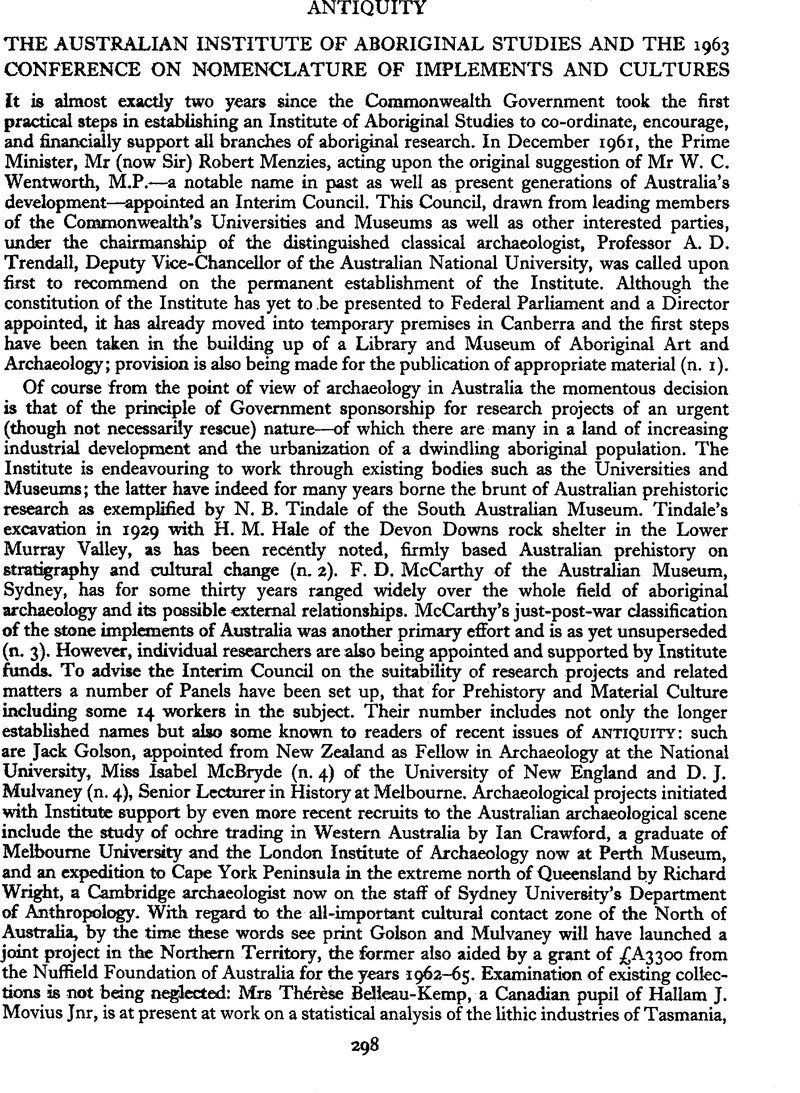Published online by Cambridge University Press: 02 January 2015

(1) The first issue of the Institute's Newsletter was published in January, 1963; for those interested in receiving copies, application should be made to the Administrative Assistant, Australian Institute of Aboriginal Studies, Box 553 City P.O., Canberra, A.C.T.
(2) Mulvaney, D. J. in Proc. Prekist. Soc, xxvii (1961), 65—the first comprehensive review of the Stone Age of Australia to appear in an English publicationGoogle Scholar.
(3) Memoirs Australian Mus., ix (1946), 1–94. Google Scholar
(4) See respectively ANTIQUITY (1961), 37-39 and 312–313 Google Scholar.
(5) Golson, Jack and Gathercole, Peter in ANTIQUITY (1962), 168-174 and 271–278 Google Scholar with criti¬cism by Duff, R. S. in ANTIQUITY (1963), 65–68 Google Scholar.
(6) The date of 10,950 ± 170 B.C. (NPL 33) obtained in 1962 by Mulvaney for a low level of Kenniff Cave, south-central Queensland, is the oldest so far from evidence of human occupation: Oceania, xxxiii (1962), 137. Google Scholar
(7) E.g. in Am. Antiquity, 26 (1960), 313–55Google Scholar.
(8) Recently in Selected Papers of the Vth Congress of Anthrop. and Ethnographical Sci., ed. A. F. C. Wallace (1960), 141-151.
(9) Those interested in the application of G. W. Brainerd's system of matrix analysis to archaeology as recently demonstrated for British beaker pottery by Clarke, D. L. in PPS., xxviii (1962), 371–382 Google Scholar should read Tugby's study of axe and chopper types in south-east Australia: Am. Antiquity, 24, (1958), 24–33. CrossRefGoogle Scholar
(10) Given to the 1960 CBA Conference on the British Bronze Age; q.v. Coles, J.M. in ANTIQUITY (1961), 64–65 Google Scholar.
(11) Approach to Archaeology (1959), 89 Google Scholar.
(12) Australian archaeology is indebted to the work over a number of years of Professor N. W. G. Macintosh, Department of Anatomy, Sydney University in establishing the general homogeneity of the aboriginal physical type. He considers a link with homo soloensis a possibility and is at present making himself available for the study of the so far limited skeletal remains from archaeological contexts.
(13) In 1917 the Senate of the University of Sydney refused to ratify the appointment of one V. G. Childe, already a graduate of both Sydney and Oxford, to a Tutorship in History in its Department of Tutorial Classes, clearly on the grounds of his political affiliations; the case caused a public outcry and questions were asked in the N.S.W. Legislative Assembly. One wonders but idly what might have happened to archaeology in Australia had Sydney's decision been otherwise.
(14) E. D. Gill of the National Museum of Victoria, who has been concerning himself much lately with environmental problems, ably demonstrated the application of ecological considerations to the Golson model.
(15) Oceania, XXXIII, 135. Google Scholar